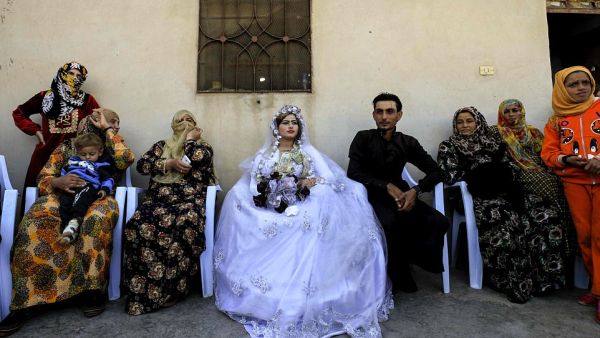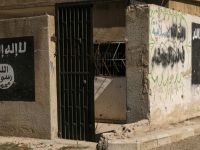- Under the harsh rule of the ISIS, women were forced to be covered from head to foot in black
- People used the wedding of Ahmad and Heba as a chance to celebrate their new freedom
- Women wore make up unafraid of the consequences while traditional poems and dances were performed
- Residents of the shattered town saw the wedding as a sign of hope for the future
At a house in Syria's Raqqa, women and men danced together in celebration at a wedding that would have been unimaginable just months ago, when the ISIS ruled the city.
Ahmad and Heba's wedding, held Friday in Raqqa's western neighborhood of Jazra, was the first in the city since U.S.-backed forces seized it on Oct. 17.
Out on the patio, a man in a dark robe and a thick puffer vest spun his prayer beads to the beat as he led a line of men and women in the dabke, a Levantine dance performed at celebrations.
The dancers hopped and swayed to-and-fro as children ran around. Elders looked on approvingly from seats and benches on the edge of the makeshift dance floor.
ISIS had previously music and dancing, imposed a strict dress code, prevented women from wearing make-up, and forcefully prohibited the mixing of men and women.
But in Jazra on Friday, music mingled with the sound of generators providing the only electricity in the ravaged district, which like much of the city was heavily damaged during more than four months of fighting.
Jazra was one of the first districts of Raqqa to be captured by the U.S.-backed Syrian Democratic Forces, an alliance of Kurdish and Arab fighters that broke into the city in June.
- Over 100,000 People Detained in War-Torn Syria Since 2011, NGO
- Rukban Camp: Struggles of Insufficient Aid in the No Man's Land
The groom's family, unlike many others who fled Raqqa during the fighting, were able to return to their neighborhood and celebrate.
"Before [ISIS], there was dabke, songs and the traditional rituals of the region at our marriages, but [ISIS] banned everything, there was not a single celebration," Ahmed's father Uthman Ibrahim told AFP.
"Today it's a return to joy," he added, his face lit up with happiness. "It's been a long time."
An elderly man, wearing a long robe and a pristine white headscarf, performed mawals, unaccompanied poetic songs sung across the Middle East.
Female guests, forced under jihadist rule to wear all-enveloping black including gloves and face veils, took obvious delight in sporting patterned robes and bright red lipstick. Some covered their hair with matching patterned scarves, while others, including the bride, had their locks coiffed for the occasion.
Eighteen-year-old Ahmad wore a traditional brown robe, while his new wife was dressed in a frothy white wedding dress, a layer of tulle embroidered with a floral pattern draped over its ballgown bottom.
A delicate veil edged with white flowers rested on her tightly curled hair, and a gold headpiece dangled over her eyebrows, darkened with makeup. Her hands were painted with henna patterns and she fiddled nervously with a bouquet of artificial flowers.
Around the couple, guests took photos with mobile phones while little girls also made-up with darkened eyebrows and colored lips danced to the beat of the music.
- This Month in Damascus: Complaints About ISIS-Like Textbooks and More
- Al-Qaeda Militants Encroach on 'Every Aspect of Civilian Life': A Conversation with Idlib Residents
"It's been a long time since we've had a party," said Umm Ahmed, the groom's 25-year-old cousin, dressed in a traditional robe with black hair tumbling over her shoulders.
"We're celebrating with joy this marriage after the end of [ISIS'] rule," she said with a large smile. "We'll party as we like."
The smell of perfume hung in the air, and women ululated in celebration.
Khalaf al-Mohammed, another of the groom's cousins, was delighted by the celebration.
"It's been years since we danced the dabke, we're tasting life again," the 27-year-old said, leading the line of dancers and spinning his prayer beads.
For now, Raqqa is virtually uninhabitable, with many buildings destroyed and large parts of the city off-limits for fear of unexploded ordnance.
Hundreds of civilians were killed in the fighting and many residents are still searching for missing family members.
But for the wedding guests, the celebration was a glimmer of hope for the future.
"Raqqa will be happy again," said Khaldiya, the groom's aunt, 30, as she tapped out a beat on a small drum.
This article has been adapted from its original source.








